From Latin, we move on to French. Words of French origin make up nearly half of the words that we use in English today! French words traveled to England and then to America. Here are a few facts about the French influence on the English language:
- Today’s vocabulary is about 45% of French origin.
- More than 10,000 French words were borrowed during the Middle English period.
- French was the principal language of culture and civilization in the eighteenth and nineteenth centuries in Europe.
- Today French words and phrases are often perceived as elegant and educated.
Let's examine five French words. Look at each word and try to pronounce it. It may take you a couple of tries to sound out the words or phrases, but the links to the pronunciations will help you.
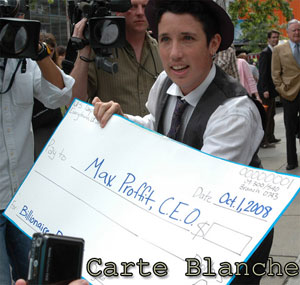
“No bailout for billionaires,” Joe Newman, Flickr
carte blanche
noun
Language: French (“white, or blank, paper,” the French sign for military surrender)
Merriam-Webster Dictionary pronunciation:
\'kärt- 'blänsh,- 'blänch\
How it’s used: Giving someone carte blanche suggests that they have full authority to make decisions. Giving someone a signed blank check implies the same thing; you’ve put your trust in that person to make decisions.
History: This phrase comes from the French term for military surrender, akin to waving a white flag. The act of surrendering puts one group under the authority of another group. In a sense, the winning party gets a “blank check” to write the terms of the surrender.
Example: During my vacation, Barbara has carte blanche to make decisions in my stead.
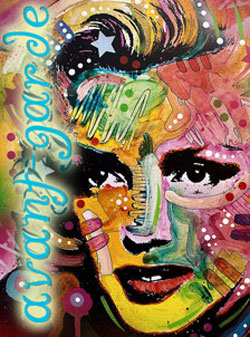
Source: Mixed Media Painting by Dean Russo at Dumbo Arts
Center “Art Under the Bridge” festival 2009, See-ming Lee, Flickr
avant-garde
adjective, noun
Language: French (“advance guard,” “vanguard,” the leading edge of a military formation)
Merriam-Webster Dictionary pronunciation:
\ä-, vän(t)- 'gärd\
How it’s used: Avant-garde describes something that’s radically original, new, and maybe strange and unusual. As a noun, avant-garde also describes the people that create and experiment with exciting new ideas and concepts, particularly in the arts. The term “cutting edge” can be a synonym.
History: English borrows many words of the language of art from French. Avant-garde was first used in a non-military manner in 1825. In the essay “The Artist, the Scientist, and the Industrialist,” writer Olinde Rodrigues suggested that artists help change and reform society by serving as the people’s avant-garde. Since then, the term has referred to writers, musicians, and artists who are willing to experiment and break boundaries.
Example: Paul’s visionary, wild, and experimental fashion designs are so avant-garde that the other designers won’t catch up to him for 20 years.
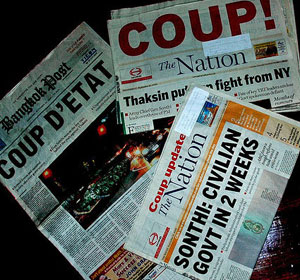
Source: “No bailout for billionaires,” Joe Newman, Flickr
coup d’état
noun
Language: French (“stroke (coup) of state”)
Merriam-Webster Dictionary pronunciation:
\,kü-(,)dā- 'tä\
How it’s used: This word describes the sudden, often violent, overthrow of a government, particularly by a small group of people. More generally, coup d’état can describe any unexpected and questionable change of the person or persons in charge. Frequently the short form, coup, is used to describe anybody suddenly, surprisingly, getting their way or shaking things up (i.e., “Marcy’s final lap victory was a real coup!”).
History: Coup d’état is another instance of borrowing French words that are used when discussing diplomacy and politics. The earliest English use of coup d’état is in a 1646 biography of France’s King Louis XIII. England hadn’t had the long, colorful history of surprising leadership changes of the French and had to borrow the word from a nation with more experience!
Example: Contestants on reality shows such as Survivor and Big Brother often form alliances that are swiftly dismantled by coup d’états near the end of their seasons.
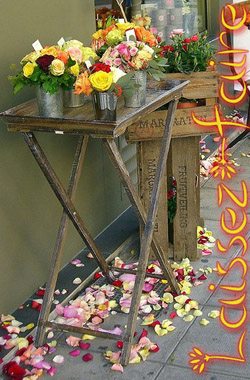
Source: “au nom de la rose,” Chris230***, Flickr
laissez-faire
noun or adjective
Language: French (“let do”)
Merriam-Webster Dictionary pronunciation:
\,le- ,sā- 'fer\
How it’s used: Politically, laissez-faire describes a hands-off approach—as little government interference as possible, particularly in foreign affairs. For example, “free trade” is a laissez-faire concept. In informal situations, anything involving little or no effort could also be seen as laissez-faire.
History: Around 1680, the French government, under King Louis XIV, asked how they could help merchants improve trade and grow business. The answer they received was “leave us alone” or laissez-nous faire. This may or may not be historically-accurate, but since then, the laissez-faire approach, a principle opposed to bureaucratic regulation and artificial restriction, has been part of our discussions in government.
Example: Laissez-faire seems great for small businesses because too much government control makes running a business difficult.
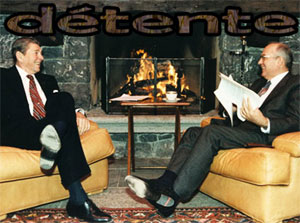
Source: U.S. President Ronald Reagan and Soviet General
Secretary Mikhail Gorbachev meeting in Switzerland in 1985,
Wikimedia Commons
détente
noun
Language: French (“relaxation”)
Merriam-Webster Dictionary pronunciation:
\dā- 'tänt\
History: While détente has been in the news since 1908, it is often used to specifically describe a period of negotiations, trade, and friendly relations between the United States and the Soviet Union in the 1970s—a brief thaw in the Cold War.
Example: In the Middle East, Israel, and Pakistan may finally be moving toward a détente after a long period of hostile relations.
The next exercise will allow you to practice finding context clues around words you don’t know. Read the sentences below. They were taken from essays and articles about world events. After reading each sentence, highlight the foreign word or phrase by clicking on it. Next, find the words or phrases in each sentence that provide clues about the meaning of the foreign word. Click to highlight the clues. Keep trying until one word and one clue are highlighted in each sentence.
- Two years later, Napoleon III engineered a coup d’ etat, proclaimed the Second Empire, and introduced a dark new era of political repression and intellectual censorship.
- Senator Durbin took aim at President Obama’s détente with the drug industry while the President struck a deal with them to pass healthcare reform.
- The king had written the book Daemonlogie, which gave his subjects carte blanche to hunt down witches wherever they found them.
- His laissez faire beliefs seemed cruel because he allowed people to suffer rather than make laws to protect them.